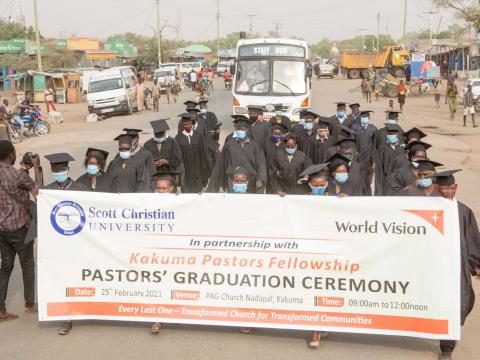Empowering religious leaders to become change agents

By Sarah Ooko, World Vision Senior Communications & Media Officer
Over 300 religious leaders have been empowered to become agents of change, so they can transform the lives of children and families in their communities.
The faith leaders underwent a two-year course in Christian Ministry offered by the Scott Christian University, which was sponsored by World Vision through its Every Last One-Transformed Churches for Transformed Community (ELO-TCT) project in Kenya.
The course offers theological training, as well as insightful lessons on effective community development approaches among the learners.

This empowers church leaders to be able to offer spiritual nourishment to their congregants, while at the same time coming up with effective strategies to help tackle development challenges that affect the well-being of their communities.
The trained faith leaders were drawn from the following nine counties in Kenya: Lamu, Kilifi, Isiolo, Turkana, Narok, Bomet, Migori, Nyeri and Taita-Taveta.
"I must say that this is a prayer answered. We prayed for many years, asking God for help and he came to us through World Vision," said Pastor Lawrence, one on the beneficiaries of the training from Kakuma in Turkana County.

He noted that having the 'call' to serve God is not enough. "As a pastor, you also need to have the knowledge on how to undertake the task and enable people to experience God's love in their lives. This training helped me to achieve that. Now I know how to prepare messages and put them into context," he stated.
Pastor Masela, who also benefitted from the project, stated that she learnt about the importance of having alternative sources of income instead of relying solely on church offering from congregants.

"If you have an economic activity, it enables you as a faith leader to be self-sufficient and to be able to focus on God's work. The training also helped me to become eloquent and more organised in my preaching and ministry," said Pastor Masela.
"The church is an indispensable partner of World Vision. As a child-focused Christian organisation, we work closely with faith leaders to address the various spiritual, social and economic challenges that prevent children from living life in all its fullness," said Dennis Sabila, the ELO-TCTC project co-ordinator for World Vision in Kenya.
Dennis noted that due to the influence that the church has in most Kenyan communities, religious leaders can play a key role in helping people to abandon harmful cultural practices like FGM and child marriage that impede development in societies.
They can also use their influence to empower communities to get involved in development initiatives that can transform their lives and improve the well-being of children.
"Partnering with the church also helps in the sustainability of projects. World Vision operates in an area for a definite period of time. But the churches are there to stay. They will still exist in an area, long after we have left," he said.